Author: Zsófia Rába
At United Rising, we believe storytelling is one of the most powerful forms of activism. It allows people not just to speak, but to exist fully, freely, and without reduction. When we first reached out to Sami filmmaker and writer Suvi West, it was not because of her awards or the political weight of her films. It was because of the emotional clarity and creative courage that live in her work. Through cinema, voice, and now literature, Suvi reclaims space for the messiness of real Indigenous life, beyond headlines and heroic portrayals.
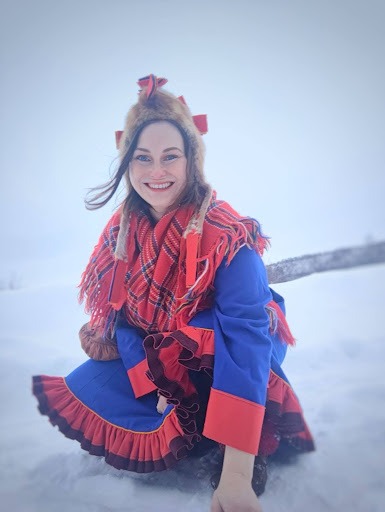
This interview took place on the morning of a milestone in Suvi’s life: the release of her first novel. Over the course of our conversation, we explored her evolution as an artist, her relationship to Sami identity, the burden of expectation, and the deeply personal reasons why she tells stories at all. What emerged was not only a portrait of a storyteller, but a reflection on how art can be a form of freedom, healing, and self-definition.
A story that writes itself
“I felt that I needed to write myself away. I needed to get rid of all the expectations… from being in publicity for 20 years”, she said. This was not just about writing a book. It was about shedding the image she had been assigned by others: the activist, the Indigenous representative, the explainer of Sami identity. She needed, instead, to write something chaotic, honest, and strange. Something for her.
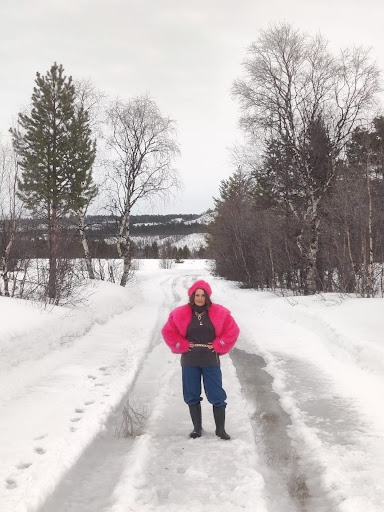
“It’s a fictional story,” she told me, “but it is pretty surrealistic.” Her protagonist, Suvi Vest, a fictional filmmaker clearly connected to her own life, tries to write about others but ends up entangled in her own memories, ex-lovers, and inner dialogues. “It’s a comedy,” she explained. “It gives questions of representation, stereotypes, expectations, and the woman’s role… and also the theme of being an artist.”
The story’s turn toward fiction wasn’t planned. “It actually started out as nonfiction,” Suvi said. “Then I decided I didn’t want to do this. And then the fictional story came out; it was such a powerful moment… I felt that it was an extremely purifying experience.” The result became something deeply personal, if not autobiographical. “I’ve been saying this is not important. I don’t want people to think about it as important… I want it to be more like something that art can just be.”
By stepping away from the burden of being ‘important,’ Suvi paradoxically created something deeply resonant. Her novel doesn’t demand to be read; it invites the reader into a relationship as intimate and complex as its creator.
Listening to the Spirit of the Story
Suvi doesn’t begin her creative work with a clear direction. “I am that kind of storyteller that I don’t know clearly what I’m going to do,” she explained. “I really feel that there is a spirit of the story” That spirit, she said, leads her, if she’s willing to listen. “You just need to kind of listen to the spirit of the story and let it lead you.”
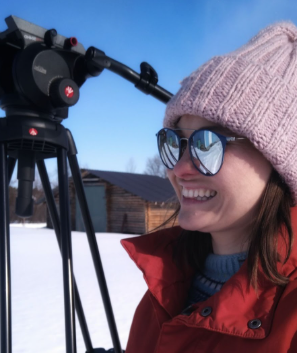
This openness means her stories take time, sometimes years, to fully emerge. “I gather material by making material,” she said. “So my prospects develop and they can take a different direction.” Her documentary Homecoming, for instance, began from a moment of instinct: reading about a repatriation project at the Finnish National Museum. “We decided to start following that… even though we didn’t know why or what or how,” she said. “The first two years were really heavy… I was almost giving up. But then, things changed when I was in the rock bottom and the story came and after that it was beautiful.”
That transformation, from confusion to clarity, from exhaustion to beauty, is part of every project she makes. But it isn’t easy. “It’s not heavy only for me,” she said, “but for those who trust me, producers, publishers.” She’s grateful to have found collaborators who support her unpredictable, intuitive way of working.
The Weight of Expectation, the Need for Freedom
Over the years, Suvi has become known publicly for representing Sami people and Indigenous rights in Finland. But that visibility comes with a cost. “The major society sees me mainly and solidly as a Sami person who should represent Sami people,” she said. “There is no room to be artistically free.” Even the media, she noted, constructs an image of her that feels inaccurate. “I don’t recognize myself in the public image. I’m not that smart. I’m not that good person.”
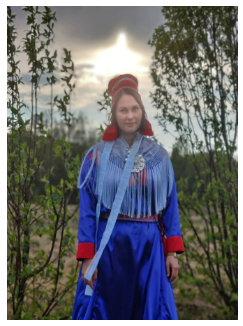
She doesn’t reject activism; on the contrary, she’s taken part in it because she feels she must. But it isn’t her identity. “I do it because I feel I have to,” she said. Her role, she insists, is first and foremost that of a storyteller.
This distinction matters. It explains why her newest work, though still grounded in identity and cultural experience, comes from a different place. “Instead of telling stories to others, now I … tell stories to myself,” she said. “It’s more like a self-care… something I need so I can continue being a storyteller.” After years of carrying public responsibility, this shift toward self-expression is a way to recharge. “I’m on holiday,” she laughed. “I’m not serving anyone else than myself.”
Still, the sense of obligation doesn’t vanish. It lives inside her and many others from her community. “We want to preserve our culture for future generations,” she said. “So it means we have to do something, because otherwise, it will disappear.”
Why Stories Still Matter
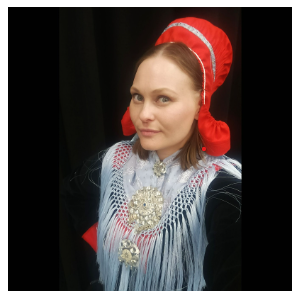
Given the state of the world, Suvi sometimes questions whether art and storytelling are enough. “The importance the question of being important and the question of if it’s really needed in this stage where we are living in the world, that is simply horrible.” But one experience gave her clarity. While teaching in Vienna, she wandered into a Mozart concert, held in the basement of the composer’s house, just after reading a devastating climate report. The music was transcendent.
“I felt like I was in the Titanic,” she said. “And we were the orchestra. We need to keep doing what we do.”
That moment reminded her why culture matters, especially now. “It was so emotional… to realize how important culture and storytelling are,” she said. “We people need us more than ever, even though they are cutting all our livelihoods away.”
Stories, Suvi believes, don’t have to be explicitly political to be meaningful. “We have to tell important social stories,” she said. “But we also have to make funny comedies with nothing important in them.” Both have value. Both can be transformative.
Conclusion: Letting Go of Importance, Returning to the Self
Spending an hour with Suvi West revealed not only the artistry behind her work, but also the vulnerability, uncertainty, and humor that rarely make it into interviews. She speaks with honesty about burnout, about the strange, beautiful process of releasing a story into the world, like letting go of a lover. “They’re like ex-lovers,” she said. “They stay in my heart, but they’re no longer mine.”
What stayed with me most is Suvi’s ability to hold contradiction. She is committed and restless, grounded in community yet fiercely independent. She doesn’t reject the political; she simply insists on also being personal. That balance is rare, and it’s what makes her voice so relevant to United Rising’s work.
In a world where Indigenous artists are so often asked to explain, justify, and represent, Suvi West offers something radically different: the permission to simply be. To tell stories that are heavy or light, structured or messy, for the world or for no one at all. “I’m just the storyteller,” she said. And that, truly, is enough.
Watch the Full Interview
To hear Suvi’s full story in her own words, you can watch the complete interview, here,on United Rising’s YouTube channel. It is a conversation about art, identity, and intuition, unfiltered and deeply human.
Photos in the Article are unofficial photos credited to Suvi West and Anssi Kömi